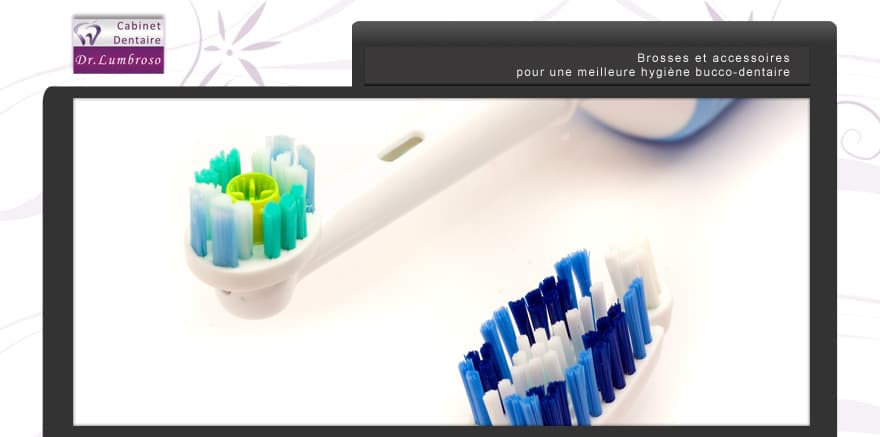Les brosses et autres accessoires de santé bucco-dentaire
Selon une étude récente, près d’un tiers des Français ne se brosserait les dents qu’une fois par jour, alors qu’un brossage après chaque repas serait l’idéal. Pourtant ce n’est pas l’offre qui manque en matière de brosses et d’accessoires de santé bucco-dentaire. Nous vous expliquons dans cet article comment vous y retrouver.

La brosse à dent : électrique ou manuelle ?
Avec 11,5 % d’utilisateurs en France, la brosse à dent électrique n’est pas près d’inquiéter la traditionnelle brosse à dents manuelle, bien qu’elle connaisse un succès grandissant. Que vous choisissiez l’une ou l’autre, il faudra dans les deux cas privilégier des modèles à petite tête, qui pourront atteindre les zones difficiles d’accès. Si votre gencive est fragile, il faudra préférer une brosse à dents aux poils souples voire extra-souples. Dans tous les cas le temps de brossage doit durer en moyenne trois minutes pour un nettoyage efficace sur toutes les zones dentaires. Souvenez-vous surtout que le bon geste prime sur le reste, notamment sur le type de brosse à dents que vous utilisez. Néanmoins certaines études tendent à démontrer une plus grande efficacité des brosses électriques, en particulier des brosses associant un mouvement de rotation alternatif avec des pulsations. Quoi qu’il en soit il semble admis que l’acquisition d’une gestuelle adaptée est plus facile avec une brosse électrique qu’avec une brosse manuelle. Alors à vos chargeurs !
Le gratte-langue
Une bonne partie des brosses à dent manuelles que vous trouverez dans les commerces est désormais équipée d’un gratte-langue situé sur le dos de la tête. Très efficace, ce petit accessoire reste pourtant sous-utilisé. Il permet en effet de réduire jusqu’à 60 % de la masse bactérienne présente dans la bouche, et par conséquent de lutter contre la formation de la plaque dentaire et de la mauvaise haleine. Le gratte-langue doit être utilisé à chaque brossage pour une efficacité optimale.
Le fil dentaire et les brossettes interdentaires
Pour lutter efficacement contre la plaque dentaire, vous pouvez associer à la brosse à dents et au gratte-langue l’utilisation du fil dentaire ou encore des brossettes interdentaires. Ces deux accessoires permettent de mieux nettoyer les espaces interdentaires que la brosse à dent ne peut atteindre. Il faut savoir que ces espaces sont des niches de protection pour les bactéries ! Ils représentent le principal risque de survenue des caries dentaires et des maladies de gencive. L’utilisation des brossettes est indispensable pour les patients aux antécédents de parodontite (déchaussement) et aux porteurs d’implants dentaires.
Contrairement à ce que l’on pourrait croire, il est préférable de passer le fil dentaire avant de se brosser les dents, afin d’éliminer les bactéries que l’on a pu déloger grâce au fil !
Les bains de bouche
Pour compléter votre hygiène bucco-dentaire, vous pouvez utiliser un bain de bouche, de préférence après le brossage du soir. Cependant, si celui-ci permet d’assainir la bouche et de donner un effet d’haleine fraîche, il ne doit en aucun cas remplacer le brossage des dents. Attention il n’y a que quelques bains de bouche adaptés à un usage quotidien, les bains de bouches thérapeutiques ne doivent pas être utilisés plus de 15 jours. Il existe des bains de bouche à base d’huiles essentielles adaptés à cet usage régulier. N’hésitez pas à demander conseil à votre dentiste ou à votre pharmacien.
